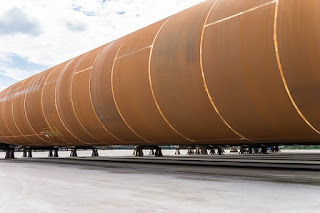Nord Stream 2 - France and Germany Reach Compromise on Amendments to EU Gas Directive
The European Council was scheduled to vote today in favour of planned amendments to the EU Gas Directive, that would effectively target the Nord Stream 2 project. While countries like Germany, but also the Netherlands and Cyprus pledged to vote against the amendments proposed by the Commission, France, in a surprise last-minute U-turn, pledged to vote in favour of the amendments. Last night, however, France and Germany reached a compromise on the issue. We take a look at the legislative history, as well as providing a legal analysis of events and discuss the legal ramifications of today´s important decision.
Historical legislative sketch
As soon as the first plans to build a second gas pipeline from Russia to Germany via the Baltic Sea (Nord Stream 2) had been announced 2015/2016, the European Commission sprang into action. At first they argued that the EU Gas Directive, designed to create an internal gas market in Europe, also applies to this pipeline project. The Commission`s own legal service, however, condemned this argument as substantially flawed, since EU rules for the EU internal gas market cannot be extended to non-EU countries. Subsequently the Commission argued that the pipeline, if build, would operate in a `legal void´, if the EU internal rules would not apply to it. This argument was equally rejected by the Commission´s own legal advisers and this sentiment was shared among Member States with an interest in the pipeline project (above all Germany).
In 2017 the European Commission, acknowledging its flawed argumentation, decided to change its legal strategy fundamentally. It now decided to alter the laws, above all the EU Gas Directive. On 8 November 2017 the European Commission issued a proposal for a Directive
amending Directive 2009/73/EC concerning common rules for the internal market in
natural gas COM(2017) 660 final. The main aim of the proposed Directive is to make the Gas Directive in its entirety applicable to gas pipelines that are connecting a third state with a EU state, like the envisaged Russian-German Nord Stream 2 pipeline.
This amendment has today been voted upon.
Legal Analysis
Under the proposed amendment to the gas directive the definition of the word `interconnector´ of article 2 (17) EU Gas Directive shall change. All mechanisms of the Gas Directive like third-party access, tariff regulation, ownership unbundling and transparency would then not only apply to gas pipelines running from one EU member state to another (current legal situation), but also to pipelines coming from third countries into the EU. The EU admits that the rules on interconnectors are not applicable to pipelines entering the EU as of yet, but claims that `there [already] is an practice of applying core principles of the regulatory framework set out by the Gas Directive in relation to third countries`(page 2). The EU says that this `practice shall now be merely set out in a explicit and coherent manner` (page 2).
The European Commission says that the amendments seeks to implement key objectives of the Energy Union, especially in the dimension of energy security (whereas one of the key drivers of energy security is the completion of the internal energy market) (page 3). The president of the European Council Donald Tusk, repeatedly said that Nord Stream 2 would contradict EU energy security interests. He also left no doubt that the amendment is designed with the sole purpose of stopping Nord Stream 2, even urging Member States in a letter to speed up the legislative process to resolve the proposal before the Nord Stream project is completed in 2019.
The background for this is the fact that, if the project is completed before the new legislation is moving into place, Germany could apply for an extension from the unbundling rules under art. 36 Gas Directive 2009/73/EC and Nord Stream 2 would, if approved, not have to comply with these rules. All of this is relevant because Gazprom is viewed by the EU as a company that does not fulfil the EU`s standards on unbundling in the energy sector and the EU repeatedly tried to bar Gazprom from operating in the EU (see for instance the so called `Gazprom clause` in art. 11 Gas Directive).
France and Germany now apparently reached a compromise that could alter the proposed amendments. According to media reports is the compromise, that has been seen by the news agency AFP, tailored to shift responsibility for external `interconnectors´ to the regulatory authorities of the Member State where the external pipeline first enters the EU. Oversight will come from the "territory and territorial sea of the member state where the first interconnection point is located," according to a copy of the draft obtained by AFP. This would mean the German regulator would be in charge to decide on Nord Stream 2, not the EU.
Outlook and implications
The consequence of today`s decision is an intensified race to complete the pipeline before the new amendments come into force. 600 of the 1200 Kilometres of Nord Stream 2 have already been built, but whether the pipeline project can be completed and move into operation remains to be seen. The big winner of this EU decision are the USA, who criticized the pipeline project from the start. North America is witnessing a `gas glut´ and the USA would much like to sell their gas, in the form of liquefied natural gas (LNG) to Europe. The US `gas glut´, however, is largely based on the extraction of shale gas, an activity that is prohibited in most EU Member States. It would be highly hypocritical to ban shale gas in EU Member States and then just buy the exact same thing from the Americans, as scholars and NGOs pointed out.
Historical legislative sketch
As soon as the first plans to build a second gas pipeline from Russia to Germany via the Baltic Sea (Nord Stream 2) had been announced 2015/2016, the European Commission sprang into action. At first they argued that the EU Gas Directive, designed to create an internal gas market in Europe, also applies to this pipeline project. The Commission`s own legal service, however, condemned this argument as substantially flawed, since EU rules for the EU internal gas market cannot be extended to non-EU countries. Subsequently the Commission argued that the pipeline, if build, would operate in a `legal void´, if the EU internal rules would not apply to it. This argument was equally rejected by the Commission´s own legal advisers and this sentiment was shared among Member States with an interest in the pipeline project (above all Germany).
In 2017 the European Commission, acknowledging its flawed argumentation, decided to change its legal strategy fundamentally. It now decided to alter the laws, above all the EU Gas Directive. On 8 November 2017 the European Commission issued a proposal for a Directive
amending Directive 2009/73/EC concerning common rules for the internal market in
natural gas COM(2017) 660 final. The main aim of the proposed Directive is to make the Gas Directive in its entirety applicable to gas pipelines that are connecting a third state with a EU state, like the envisaged Russian-German Nord Stream 2 pipeline.
This amendment has today been voted upon.
Legal Analysis
Under the proposed amendment to the gas directive the definition of the word `interconnector´ of article 2 (17) EU Gas Directive shall change. All mechanisms of the Gas Directive like third-party access, tariff regulation, ownership unbundling and transparency would then not only apply to gas pipelines running from one EU member state to another (current legal situation), but also to pipelines coming from third countries into the EU. The EU admits that the rules on interconnectors are not applicable to pipelines entering the EU as of yet, but claims that `there [already] is an practice of applying core principles of the regulatory framework set out by the Gas Directive in relation to third countries`(page 2). The EU says that this `practice shall now be merely set out in a explicit and coherent manner` (page 2).
The European Commission says that the amendments seeks to implement key objectives of the Energy Union, especially in the dimension of energy security (whereas one of the key drivers of energy security is the completion of the internal energy market) (page 3). The president of the European Council Donald Tusk, repeatedly said that Nord Stream 2 would contradict EU energy security interests. He also left no doubt that the amendment is designed with the sole purpose of stopping Nord Stream 2, even urging Member States in a letter to speed up the legislative process to resolve the proposal before the Nord Stream project is completed in 2019.
The background for this is the fact that, if the project is completed before the new legislation is moving into place, Germany could apply for an extension from the unbundling rules under art. 36 Gas Directive 2009/73/EC and Nord Stream 2 would, if approved, not have to comply with these rules. All of this is relevant because Gazprom is viewed by the EU as a company that does not fulfil the EU`s standards on unbundling in the energy sector and the EU repeatedly tried to bar Gazprom from operating in the EU (see for instance the so called `Gazprom clause` in art. 11 Gas Directive).
France and Germany now apparently reached a compromise that could alter the proposed amendments. According to media reports is the compromise, that has been seen by the news agency AFP, tailored to shift responsibility for external `interconnectors´ to the regulatory authorities of the Member State where the external pipeline first enters the EU. Oversight will come from the "territory and territorial sea of the member state where the first interconnection point is located," according to a copy of the draft obtained by AFP. This would mean the German regulator would be in charge to decide on Nord Stream 2, not the EU.
Outlook and implications
The consequence of today`s decision is an intensified race to complete the pipeline before the new amendments come into force. 600 of the 1200 Kilometres of Nord Stream 2 have already been built, but whether the pipeline project can be completed and move into operation remains to be seen. The big winner of this EU decision are the USA, who criticized the pipeline project from the start. North America is witnessing a `gas glut´ and the USA would much like to sell their gas, in the form of liquefied natural gas (LNG) to Europe. The US `gas glut´, however, is largely based on the extraction of shale gas, an activity that is prohibited in most EU Member States. It would be highly hypocritical to ban shale gas in EU Member States and then just buy the exact same thing from the Americans, as scholars and NGOs pointed out.




According to media reports is the compromise, that has been seen by the news agency AFP, tailored to shift responsibility for external `interconnectors´ to the regulatory authorities of the Member State where the external pipeline first enters the EU.
ReplyDeleteHealth write for us
This comment has been removed by a blog administrator.
ReplyDeleteThis comment has been removed by a blog administrator.
ReplyDeleteThis comment has been removed by a blog administrator.
ReplyDeleteThis comment has been removed by a blog administrator.
ReplyDeleteThis comment has been removed by a blog administrator.
ReplyDeleteThis comment has been removed by a blog administrator.
ReplyDelete